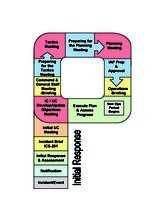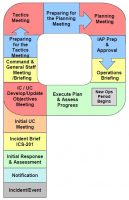
EMSI is pleased to announce that we will be attending and supporting the All-Hazards IMT Association (AHIMTA) 2017 Training & Education Symposium in San Diego, CA, in December 2017. As part of our involvement in the symposium, we will be offering our recently revised and enhanced ICS-220 Initial Response Team course (All-Hazards Initial Response) during the pre-symposium training days on December 2-3.
Recognizing a critical ICS training shortfall, EMSI developed ICS-220 Initial Response Team, an advanced ICS training course greatly expanding on initial response management concepts, to better prepare response personnel for managing the often chaotic and dynamic initial stages of the response, with additional focus on a prolonged posture in this critical portion of an incident lifecycle.
Since approximately 95% of all incidents never leave what is often referred to as the stem of the Planning “P” (the Operational Planning Cycle), the standard NIMS All-Hazard ICS training curriculum is substantially deficient in addressing today’s complexities in preparing responders to effectively utilize ICS in the chaotic and dynamic initial response phase of an incident. While ICS-200 is a system course intended for single resources and initial action incidents, the concepts tend to be more foundational and less practical. The next level of system training, ICS-300, quickly jumps out of the initial response phase and focuses on “expanding incidents”, while placing a heavy emphasis on the proactive, managed phase of the incident, typically referred to as the cyclical part of the Planning “P”, for Type 3 (Tier 2) and beyond incidents.
To address this critical gap, EMSI has updated and enhanced our training course: ICS-220 Initial Response Team. This course serves as a, first-of-its-kind, 200-level team/organization course similar to S-420 – Command and General Staff, but with a focus on initial response and/or prolonged activities in the stem of the Planning “P”.
Why is this so critical? To quote EMSI founder and original FIRESCOPE Task Force member Chuck Mills, “What starts right, stays right”. The foundation for a successful response is established in the initial reaction to an event, but seldom are incident management professionals trained and prepared to implement effective ICS in those initial, chaotic stages of an incident. Particularly with today’s complexities, it is vital for initial response teams to rapidly achieve success in matching incident circumstances.
Similar to the NWCG S-200 Initial Attack course, this course prepares participants to assume command and effectively direct and manage resources in the initial response phase (stem of the Planning “P”). Also serving as a team course, the ICS-220 course prepares responders, beyond the Incident Commander position, to serve in various initial response overhead support roles as members of an initial IMT. “Initial Response” refers to the initial reaction to an expanding incident of increased complexity (Type 3 or Tier 2 and beyond), but the concepts are also applicable to the initial response and closeout of short-duration, low-complexity incidents (Type 4 or Tier 1 and below) with single resources.
As a position course, ICS-220 Initial Response Team is intended for responders who may serve as Incident Commander in the initial stages of a more complex incident (Type 3/Tier 2 or greater) or for the duration of a less complex incident (Type 4 or 5 or Tier 1 or 2). It prepares response personnel to assume command in the early stages of an incident and establish a solid management groundwork upon which follow-on response actions can be based. The concepts taught in the course build upon foundational initial response and initial action topics taught in ICS-200, while highlighting practical response concepts not formally taught in any standard NIMS All-Hazard ICS curriculum and preparing response personnel to function effectively in the position of Initial Response Incident Commander.
As a team course, ICS-220 is intended to prepare a group of responders to function as an initial response Incident Management Team, focusing on establishing the initial response organization and working as an IMT in the initial, and oftentimes highly complex, stages of an incident. While developing a team approach to initial response incident management, the course emphasizes the functions of Command and key members of the Command Staff, General Staff, and a few Unit Leaders during the early phases of an incident. For more complex incidents (Type 3/Tier 2 or greater), it prepares teams to manage the initial response until a transition to a full IMT. For less complex incidents (Type 4 or 5/Tier 1 or 2), it prepares teams to effectively manage the incident until closeout and demobilization
Course topics include:
- Size-Up and Assessment
- Managing Initial Response Operations
- Effective use of the ICS-201
- Establishing the Initial Response IMT
- Managing Extended Initial Response Operations with the ICS-201
- Establishing Support Functions
- Incident Transition
The intended audience for the course includes:
- Initial Response Incident Commanders including Type 3 and Type 4 Incident Commanders
- Members of Initial Response IMTs, including IMT “Short Teams”
- Anyone who may find themselves in a management position during an initial response
Training enrollment is limited to symposium attendees and will be managed by the AHIMTA, but here’s the best part: The AHIMTA has arranged to cover your tuition! Keep your eyes open for an enrollment announcement from the AHIMTA and sign-up early. Seats are limited!
Founded as a forum for the once fledgling Type 3 All-Hazard IMT community, the AHIMT Association was incorporated in December 2010 and now boasts of over 600 members. The Association serves as the voice of the Type 3 All-Hazards IMT community and assists the community by coordinating the development of standards and All-Hazards incident management guidance. This is the third consecutive year that EMSI is participating in the AHIMTA Symposium and the second time we have offered training as part of the symposium.
In addition to offering the ICS-220 training course, EMSI will have a booth in the vendor showcase, so we can answer any of your incident management and emergency management needs. We are excited for this opportunity and look forward to seeing members of the All-Hazards IMT community at the symposium.
Training Days: December 2-3, 2015
Symposium Sessions: December 5-7
EMSI is a premier all-hazards, full-service, multi-discipline incident management and emergency management services and solutions provider. Additionally, EMSI is a global leader in the application of the Incident Command System (ICS) for all-risk, all-hazard, multi-discipline incidents. Our ICS related services include ICS training development and delivery, ICS-themed exercises, ICS coaching, and response.


